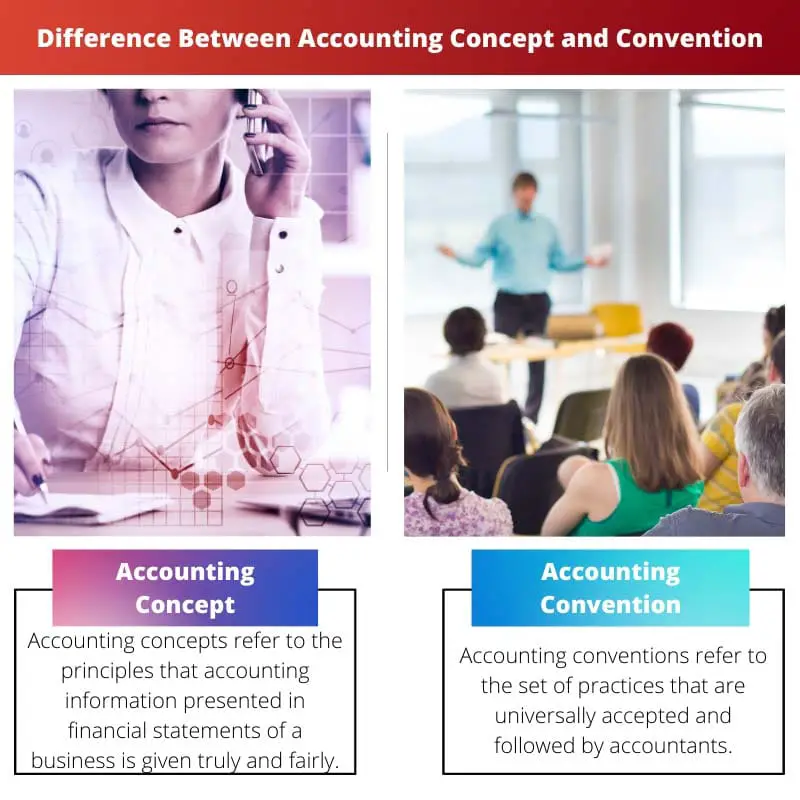Accounting concepts are fundamental principles that guide the preparation of financial statements, such as the accrual concept, which states that transactions should be recorded when they occur, not necessarily when cash is exchanged. On the other hand, accounting conventions are customary practices followed in accounting, like the conservatism convention, which suggests that accountants should err on the side of caution when making estimates or valuing assets and liabilities.
Key Takeaways
- Accounting concepts are basic principles guiding the accounting process, while conventions are customary practices followed by accountants.
- Concepts form the foundation of accounting standards, whereas conventions help ensure consistency and comparability across financial statements.
- Examples of accounting concepts include accrual and going concern, while examples of conventions include consistency and conservatism.
Accounting Concept vs Convention
Accounting concepts are fundamental principles that underlie the preparation of financial statements. It is the fundamental principles that underlie the preparation of financial statements. Accounting conventions are accepted practices that are followed in accounting.

The accounting concept is a theoretical statement. An accounting convention is a procedure agreed upon by the accounting bodies for preparing final accounts.
Comparison Table
| Feature | Accounting Concept | Accounting Convention |
|---|---|---|
| Definition | Fundamental rules and assumptions that form the foundation for preparing financial statements. | Established practices and procedures widely accepted and followed in the accounting profession. |
| Purpose | To ensure consistency, objectivity, and fairness in financial reporting, allowing users to compare financial statements across companies and over time. | To simplify and standardize accounting practices, promoting practicality and efficiency in financial reporting. |
| Basis | Underlying principles and theories of accounting, striving to reflect economic reality. | Common practices and methods accepted by the accounting profession, based on historical precedent and practicality. |
| Flexibility | Less flexible, as they are established principles designed to ensure consistency in financial reporting. | More flexible, as they can be adapted to specific situations and may evolve over time. |
| Impact on Financial Statements | Significant impact, as they determine the recognition, measurement, and presentation of financial statement items. | Moderate impact, as they influence the specific presentation and disclosure of certain financial statement items. |
| Examples | Going concern concept, matching concept, accrual concept | Materiality, consistency, full disclosure |
What are Accounting Concepts?
Accounting concepts are fundamental principles that form the basis for the preparation of financial statements. These concepts ensure consistency, comparability, and reliability in financial reporting. They guide accountants in recording, classifying, summarizing, and interpreting financial transactions.
Entity Concept
The entity concept states that a business is considered a separate economic entity from its owners. This means that business transactions should be recorded separately from the personal transactions of the owners. For example, if the owner invests personal funds into the business, it should be recorded as capital injection, distinct from personal savings.
Going Concern Concept
The going concern concept assumes that a business will continue to operate indefinitely unless there is evidence to the contrary. This concept allows accountants to prepare financial statements under the assumption that the business will remain in operation for the foreseeable future. As a result, assets are recorded at their historical cost rather than their liquidation value.
Accrual Concept
According to the accrual concept, transactions should be recorded in the accounting period in which they occur, regardless of when cash is exchanged. This means that revenues are recognized when earned and expenses are recognized when incurred, regardless of when the cash is received or paid. For example, if a company sells goods on credit, the revenue is recognized at the time of sale, not when the cash is collected.
Consistency Concept
The consistency concept requires that accounting methods and procedures once adopted should be consistently applied from one accounting period to another. This ensures comparability of financial statements over time and allows users to make meaningful comparisons. Changes in accounting policies are allowed only if there is a valid reason, and their effects should be disclosed in the financial statements.
Materiality Concept
The materiality concept states that financial information should be presented accurately and relevantly to users. Information is considered material if its omission or misstatement could influence the economic decisions of users. Accountants need to assess the materiality of information based on its nature and magnitude and disclose significant information even if it does not meet the threshold for materiality.
Prudence Concept (Conservatism)
The prudence concept, also known as conservatism, suggests that when there are uncertainties in accounting estimates, accountants should err on the side of caution. This means that potential losses should be recognized as soon as they are anticipated, while potential gains are recognized only when realized. For example, inventory is valued at the lower of cost or net realizable value to ensure conservatism in financial reporting.

What are Accounting Conventions?
Accounting conventions are traditional practices and customs that have developed over time and are widely accepted within the accounting profession. While not necessarily mandatory like accounting principles, conventions provide guidance on how certain transactions and events should be recorded, presented, and disclosed in financial statements. Here are some commonly recognized accounting conventions:
Conservatism Convention
The conservatism convention, also known as the prudence concept, advises accountants to adopt a cautious approach when dealing with uncertainties in financial reporting. This convention suggests that potential losses should be recognized as soon as they are anticipated, while potential gains should only be recognized when realized. For instance, inventory is valued at the lower of cost or market value to ensure conservative reporting of assets.
Consistency Convention
The consistency convention emphasizes the importance of maintaining uniformity and comparability in financial reporting. It suggests that once an accounting method or policy is chosen, it should be consistently applied from one accounting period to another unless there is a valid reason for change. Consistent application of accounting policies ensures that users can make meaningful comparisons of financial information over time.
Materiality Convention
The materiality convention states that financial information should be disclosed if its omission or misstatement could influence the economic decisions of users. However, not all information needs to be disclosed; only material information that is relevant and significant should be included in financial statements. Accountants must assess the materiality of information based on its nature and magnitude, ensuring that only relevant information is presented to users.
Full Disclosure Convention
The full disclosure convention requires that all significant and relevant information be disclosed in financial statements and accompanying notes to ensure transparency and completeness. This convention ensures that users have access to all pertinent information necessary to understand the financial position and performance of an entity. It includes disclosures about accounting policies, significant accounting estimates, contingent liabilities, related party transactions, and any other information that could impact decision-making.
Historical Cost Convention
The historical cost convention dictates that assets should be recorded in financial statements at their original acquisition cost, rather than their current market value. This convention provides a reliable and verifiable basis for recording assets and avoids subjective assessments of value. However, critics argue that historical cost may not accurately reflect the current economic reality of assets, especially in periods of inflation or deflation.
Revenue Recognition Convention
The revenue recognition convention outlines principles for when revenue should be recognized in financial statements. It suggests that revenue should be recognized when it is realized or realizable and earned, regardless of when cash is received. This convention ensures that revenue is recorded in the period in which it is earned, providing a more accurate representation of an entity’s financial performance.

Main Differences Between Accounting Concepts and Accounting Conventions
- Nature:
- Accounting Concepts: Fundamental principles guiding the preparation of financial statements.
- Accounting Conventions: Traditional practices and customs widely accepted within the accounting profession.
- Purpose:
- Accounting Concepts: Ensure consistency, comparability, and reliability in financial reporting by providing a framework for recording, classifying, summarizing, and interpreting financial transactions.
- Accounting Conventions: Provide guidance on how certain transactions and events should be recorded, presented, and disclosed in financial statements to enhance transparency and completeness.
- Flexibility:
- Accounting Concepts: Generally less flexible as they represent fundamental principles that underpin financial reporting.
- Accounting Conventions: Can be more flexible as they are customary practices that may evolve over time based on changes in business practices and regulatory requirements.
- Examples:
- Accounting Concepts: Entity concept, going concern concept, accrual concept, consistency concept, materiality concept, prudence concept.
- Accounting Conventions: Conservatism convention, consistency convention, materiality convention, full disclosure convention, historical cost convention, revenue recognition convention.
- Implementation:
- Accounting Concepts: Applied universally in financial reporting and form the basis for accounting standards and regulations.
- Accounting Conventions: Implemented as customary practices within the accounting profession, providing practical guidance on how to apply accounting principles in specific situations.

Last Updated : 04 March, 2024

Chara Yadav holds MBA in Finance. Her goal is to simplify finance-related topics. She has worked in finance for about 25 years. She has held multiple finance and banking classes for business schools and communities. Read more at her bio page.

The detailed explanation of each accounting concept, along with real-world examples, enhances the reader’s comprehension of these fundamental principles.
I couldn’t agree more, Eowen. The practical examples make the concepts more relatable and easier to understand.
The level of detail in describing each concept and convention makes this article an invaluable resource for both students and professionals.
The section on ‘What are Accounting Concepts?’ offers a lucid explanation of key concepts, making it easier for readers to grasp their importance and application.
Well said, Jones Matilda. The breakdown of each concept provides a comprehensive understanding of their roles in accounting.
The comparison table is extremely helpful in distinguishing between accounting concepts and conventions, making it easier to understand their respective roles and applications.
I couldn’t agree more, Florence63. The table presents the information in a clear and concise manner. It’s a great visual aid.
I found the examples provided to be especially useful in illustrating the differences between concepts and conventions.
The article succeeds in demystifying the complex world of accounting by presenting concepts and conventions in a clear and accessible manner, suitable for readers at all levels of expertise.
I completely agree, Sienna Davies. The accessibility of the content makes it a valuable reference for anyone seeking to understand these principles.
The breakdown of the going concern concept, accrual concept, and others provides a robust foundation for comprehending the principles that govern accounting practices.
I particularly appreciated the practical application of each concept and convention, making it easier to grasp their implications in real-world accounting scenarios.
Well put, Millie47. This article could serve as a valuable resource for students and professionals alike in gaining a thorough understanding of accounting concepts and conventions.
The article effectively outlines the key differences and applications of accounting concepts and conventions, providing a comprehensive understanding of these principles.
Absolutely, Robertson Joseph. The clarity of the explanations and examples makes it a valuable resource for understanding these fundamental principles.
While the article provides a good overview, it may benefit from discussing some criticisms or limitations of accounting concepts and conventions.
That’s an interesting point, Mason Stefan. It would add depth to the discussion to explore potential shortcomings of these principles.
The article presents a thorough and well-organized analysis of accounting concepts and conventions, shedding light on their significance in financial reporting.
This article does a great job of explaining the difference between accounting concepts and conventions, providing clear examples and a helpful comparison table. Very insightful!
I completely agree, Jordan27. The examples provided really help in understanding the concepts and conventions better.
The comparison of historical cost concept and fair value concept is particularly enlightening, offering insights into valuation methods used in accounting.